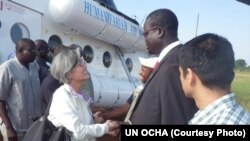JUBA —
A top United Nations official on Wednesday said millions of South Sudanese are in need of humanitarian assistance as natural disasters and violence rake the world's newest nation.
"Though the overall humanitarian situation has improved in several areas of South Sudan in the past year, millions of people are still in dire need of help," Assistant Secretary General for Humanitarian Affairs Kyung-Wha Kang said in a statement released in Juba at the end of a four-day visit to South Sudan.
"In Jonglei State’s Pibor County, violence has displaced tens of thousands of people, who need protection, basic services, and access to safety and security so that they can resume their livelihoods," Kang said in the statement.
Tens of thousands more across South Sudan have been displaced by flooding caused by months of heavy rain. The U.N. said in a report released early this month that a quarter of the more than 223,000 South Sudanese affected by the floods were in Jonglei.
Humanitarian agencies and the South Sudanese authorities have launched an appeal for $1.1 billion to meet the needs of 3.1 million South Sudanese in 2014, Kang said.
On Tuesday, when Kang visited Jonglei state, a local leader asked her to press the U.N. to establish a base there to protect residents.
Twic East Commissioner Dau Akoi Jurkuch said seven cattle raids have claimed nearly 100 lives and displaced thousands in the county this year alone.
"Where is the UN in this situation? We have been suffering and the UN is not intervening,” Akoi said as he made his plea.
But Kang said the U.N. Mission in South Sudan (UNMISS), which has 7,000 peacekeepers in the country, does not have the manpower to intervene in every attack in South Sudan. Instead, she said, the South Sudanese army, backed by local leaders, needs to take the lead in stopping attacks.
A first step toward ending the violence would be to work to end the distrust between different communities and ethnic groups, which Kang said "fuels violence and the rebel movement."
Unless a "cycle of trust" is built, she said, "I think we will see very little in terms of the outcome of assistance."
Kang also traveled to the state capital of Jonglei, Bor, and to Pibor, the heart of a rebellion led by David Yau Yau.
South Sudan's Humanitarian Affairs Undersecretary, Clement Taban Dominic, who traveled with Kang to Jonglei, said unrest in the state and elsewhere in South Sudan has prevented the government from delivering much-needed services to the people.
That would change if the violence stopped, he said.
"If we have peace, we will get all the services that we need -- the health services, the education services and anything that we need to develop our people in this great country," said Taban.
"Though the overall humanitarian situation has improved in several areas of South Sudan in the past year, millions of people are still in dire need of help," Assistant Secretary General for Humanitarian Affairs Kyung-Wha Kang said in a statement released in Juba at the end of a four-day visit to South Sudan.
"In Jonglei State’s Pibor County, violence has displaced tens of thousands of people, who need protection, basic services, and access to safety and security so that they can resume their livelihoods," Kang said in the statement.
Tens of thousands more across South Sudan have been displaced by flooding caused by months of heavy rain. The U.N. said in a report released early this month that a quarter of the more than 223,000 South Sudanese affected by the floods were in Jonglei.
Humanitarian agencies and the South Sudanese authorities have launched an appeal for $1.1 billion to meet the needs of 3.1 million South Sudanese in 2014, Kang said.
On Tuesday, when Kang visited Jonglei state, a local leader asked her to press the U.N. to establish a base there to protect residents.
Twic East Commissioner Dau Akoi Jurkuch said seven cattle raids have claimed nearly 100 lives and displaced thousands in the county this year alone.
"Where is the UN in this situation? We have been suffering and the UN is not intervening,” Akoi said as he made his plea.
But Kang said the U.N. Mission in South Sudan (UNMISS), which has 7,000 peacekeepers in the country, does not have the manpower to intervene in every attack in South Sudan. Instead, she said, the South Sudanese army, backed by local leaders, needs to take the lead in stopping attacks.
A first step toward ending the violence would be to work to end the distrust between different communities and ethnic groups, which Kang said "fuels violence and the rebel movement."
Unless a "cycle of trust" is built, she said, "I think we will see very little in terms of the outcome of assistance."
Kang also traveled to the state capital of Jonglei, Bor, and to Pibor, the heart of a rebellion led by David Yau Yau.
South Sudan's Humanitarian Affairs Undersecretary, Clement Taban Dominic, who traveled with Kang to Jonglei, said unrest in the state and elsewhere in South Sudan has prevented the government from delivering much-needed services to the people.
That would change if the violence stopped, he said.
"If we have peace, we will get all the services that we need -- the health services, the education services and anything that we need to develop our people in this great country," said Taban.




